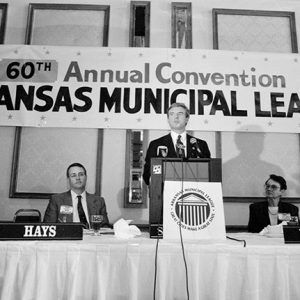calsfoundation@cals.org
Arkansas Municipal League
The Arkansas Municipal League, established in 1934, has 500 members, encompassing all of the state’s incorporated municipalities. Member cities and towns have year-round services from the league, and though league membership is voluntary, all 500 incorporated cities and towns in the state have elected to become members. The league was created to assist cities by providing information and representing cities before higher levels of government, such as the state and nation. Cities pay dues based on a sliding scale and also pay fees for direct services.
The impetus for forming the league came from mayors and chambers of commerce. Larger cities could afford to interact directly with higher levels of government, but smaller cities realized they needed to organize to make their interests known. Other states have similar organizations, so there were models available to the founders. One of the founders was Kenneth O. Warner, who taught in the Department of Political Science at the University of Arkansas in Fayetteville (Washington County) from 1931 to 1934; he served as executive director of the league from 1934 to 1935.
The executive committee, the governing body of the league, is composed of thirty members. The annual league convention, held in various locations around the state, elects six officers; the newly elected president appoints twenty-four members. The executive committee chooses the executive director, who is responsible for administering the league’s policies and programs. The executive director selects the staff, and they work together to provide services for Arkansas municipalities.
The Arkansas Municipal League’s goal is to promote the mutual interests of Arkansas municipalities. The league has been successful in securing legislation beneficial to Arkansas cities and towns. The local sales tax authority, as an example, was a league initiative. This allowed local governments to raise funds for various purposes, including paying off bond indebtedness. The league also supported legislation requiring the state to provide reimbursement in workers’ compensation claims on municipal employees. The league proposed and successfully fought to restore tort immunity for Arkansas’s local governments after the Arkansas Supreme Court had abolished it. Local governments then had the same protection from being sued, unless they agreed to the suit, as did higher levels of government. Without the representation of the league, these measures would have been much more difficult, if not impossible, to secure from the Arkansas General Assembly.
League-proposed legislation improved annexation procedures and suburban incorporation guidelines. With it, the league sought to provide Arkansas cities and towns with the laws that enable them to grow in an orderly manner without many of the problems that cities elsewhere encounter. Several laws were passed over a period of time.
State tax revenue turnback to municipalities has come about and grown since the league was formed. Arkansas emerged as a leader among the states in turning funds back to local governments so that officials and residents can determine how the funds are spent, thereby helping them attain at least a minimum level of local services. Many communities did not have a sufficient tax base to pay for even most essential services, such as fire and police protection. Turnbacks assisted them in providing such services.
The Arkansas General Assembly’s sessions every other year present a broad range of opportunities to municipalities and the league’s leadership. The league informs the cities of the opportunities presented in proposed legislation while alerting them to legislation which is not in their interest. The league then represents the cities with the legislators to obtain the most favorable possible result.
League staff members, operating out of their North Little Rock (Pulaski County) office, assist local officials with municipal problems. They provide information concerning procedures for new officials and answer questions about league programs. Group seminars and individual consultation are available to league members on municipal engineering projects or when they encounter engineering problems. The league staff civil engineer offers technical consultation, and a registered city planner, employed by the league, is available for teaching at seminars and for technical consultation with member cities and towns.
One important function of the league is that it produces several directories and other reference books. The league offers an ordinance and code service in which a city’s laws are codified and placed into one reference. Copies of the codified books of ordinances are made available to each city and town that wants to purchase the service. The Legislative Bulletin, published weekly and updated daily online during the regular legislative sessions, enables municipal officials to advise their state senators and representatives of the impacts of proposed legislation on their town. City & Town, the official publication of the Arkansas Municipal League, is published monthly and disseminates legal advice, articles about cities and towns, sales tax data, state and federal laws and regulations, health tips, tree care planning, engineering, animal control, advertising, and other information to help cities and towns run more effectively and efficiently. The Handbook for Arkansas Municipal Officials is published every other year after each regular Arkansas legislative session. Its codification of state laws that affect municipalities is a vital source of information for municipal officials. Thus, the cities receive a one-stop reference of state laws related to the interests of cities. Annual publications of the league include the Directory of Arkansas Municipal Officials and the Salary Schedule Survey.
For additional information:
Arkansas Municipal League. http://www.arml.org/ (accessed May 22, 2023).
Barton A. Westerlund and Roger K. Chisholm
Little Rock, Arkansas







Comments
No comments on this entry yet.